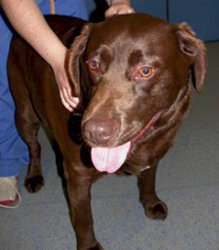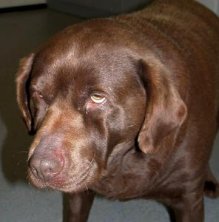Hypothyroidism in Dogs

 Symptoms of hypothyroidism in dogs can include weight gain despite eating normal or even low amounts of food; lethargy; weakness (particularly in the rear); cold intolerance; skin and coat problems that may include hair loss, a coarse, dull coat, dry or scaly skin, seborrhea with greasy skin, offensive odor from the skin and chronic infections; behavior problems such as aggression, shyness or fearfulness; seizures (as many as 77% of seizuring dogs may be hypothyroid); and more. Hypothyroid dogs often have a "tragic" expression, like the dog pictured on the left. On the right is the same dog after starting thyroid treatment. Not all dogs will show classic signs of hypothyroidism. It's best to do testing if any of these signs are present.
Symptoms of hypothyroidism in dogs can include weight gain despite eating normal or even low amounts of food; lethargy; weakness (particularly in the rear); cold intolerance; skin and coat problems that may include hair loss, a coarse, dull coat, dry or scaly skin, seborrhea with greasy skin, offensive odor from the skin and chronic infections; behavior problems such as aggression, shyness or fearfulness; seizures (as many as 77% of seizuring dogs may be hypothyroid); and more. Hypothyroid dogs often have a "tragic" expression, like the dog pictured on the left. On the right is the same dog after starting thyroid treatment. Not all dogs will show classic signs of hypothyroidism. It's best to do testing if any of these signs are present.
See my article on Hypothyroidism for updated information.
Disclaimer: I am not a veterinarian, nor do I have any formal training in any medical field. The information presented here is not meant to replace your vet's advice or prescribed medications, but only to suggest additional options to explore, based on your dog's condition.
Is your dog hypothyroid? Here are links to information from Dr. Jean Dodds, who is noted for her work with thyroid disease, and other sources:
- List of symptoms that may mean your dog is hypothyroid by Jean Dodds, DVM
- How to Test, Interpret Thyroid Function by Jean Dodds, DVM
- Diagnosis and Management of Canine Thyroid Disease by Jean Dodds, DVM
- General overview of hypothyroidism in dogs by Wendy C. Brooks, DVM, DipABVP
- With Thyroid Replacement, Consistency Matters by Heidi Lobprise, DVM
- Thyroid Can Alter Behavior by Jean Dodds, DVM
- Thyroid Dysfunction as a Cause of Aggression in Dogs and Cats by Linda. Aronson DVM & N.H. Dodman RVMS
- Thyroid Testing In Dogs: A Reference by Karen J. Wolfsheimer D.V.M. Ph.D.
- MSU FAQ on Thyroid Function in Dogs
- MSU FAQ on Thyroid Medication and Monitoring
- Autoimmune Disease by Linda Aronson, DVM
- More on AutoImmune Thyroiditis
- Information on Thyroid Disorders
- Thyroid Study in Welsh Springer Spaniels by Colleen M O'Keefe, DVM, MS
Thyroid supplements should be given to dogs twice a day, rather than once a day, as is done with humans, as dogs metabolize it faster. When testing thyroid levels after your dog is on thyroid supplementation, it is important to draw blood 4-6 hours after the supplement is given.
The article A Diagnostic Dilemma points out that low thyroid can be a symptom of other problems, not just thyroid disease, and contains a lot of information about thyroid testing and about the need to stop the supplement to see if symptoms return, even if your dog shows improvement with supplementation. Note that the term "euthyroid" refers to normal thyroid function; "euthyroid sick syndrome" means low thyroid due to non-thyroidal illness (thyroid function is normal but something else is suppressing the thyroid).
Note that thyroid disease can precipitate or aggravate existing seizure disorders. Also see Thyroid and Seizures. There's also a good general article on hypothyroidism at http://members.aol.com/Tedenbert/bhealth.html. Vaccinations may also contribute to auto-immune disorders, including hypothyroidism.
Adding a small amount of kelp to a homemade diet can be good for the thyroid because of the iodine it contains, but if your dog has thyroid disease, he will need to be treated with a prescription thyroid replacement; adding kelp is not going to cure a thyroid problem unless it was caused by an iodine deficiency. Selenium deficiency may also contribute to hypothyroidism, so it may be worthwhile to try supplementing with small amounts (no more than about 75 mcg per day for a large dog, proportionately less for smaller dogs). However, supplementing with kelp, and feeding a raw diet, may reduce the amount of thyroid supplementation needed. If you do make such a change to your dog's diet, be sure to monitor his thyroid to see if the dosage needs to be adjusted. Also, be aware that too much iodine (from over-supplementing kelp) can actually lead to hypothyroidism.
There are natural thyroid supplements that may help if the condition is not too bad. Armour Thyroid and Westhroid are natural thyroid supplements that may be used in place of synthetic supplements. These natural supplements contain T3 (as well as small amounts of T4) and may help dogs that cannot convert T4 to T3. Thyrolar and Cytomel are two other supplements that contain T3, for those dogs that continue to have problems despite normal T4 and TSH values. See the following articles for more information on Armour Thyroid vs. Synthroid:
Synthroid: Not FDA Approved! (click on Synthroid under Articles)
Why Do You Insist on Synthroid Instead of Armour? -- A Patient's Letter
How To Switch From Synthroid To Armour Thyroid
There are also raw thyroid glandulars and glandular supplements that can help support the thyroid gland, but do not actually provide thyroid hormones. These are available from companies like Premier Labs, Enzymatic Therapy (available at Amazon), American Biologics (available at Amazon), Integrative Therapeutics, and Nutri-Meds, as well as the commonly prescribed Thytrophin PMG from Standard Process (the version for dogs is Canine Thyroid Support available at Amazon) .
I regret that I no longer have much time to respond to questions. See my Contact page for more information. My name is Mary Straus and you can email me at either or
